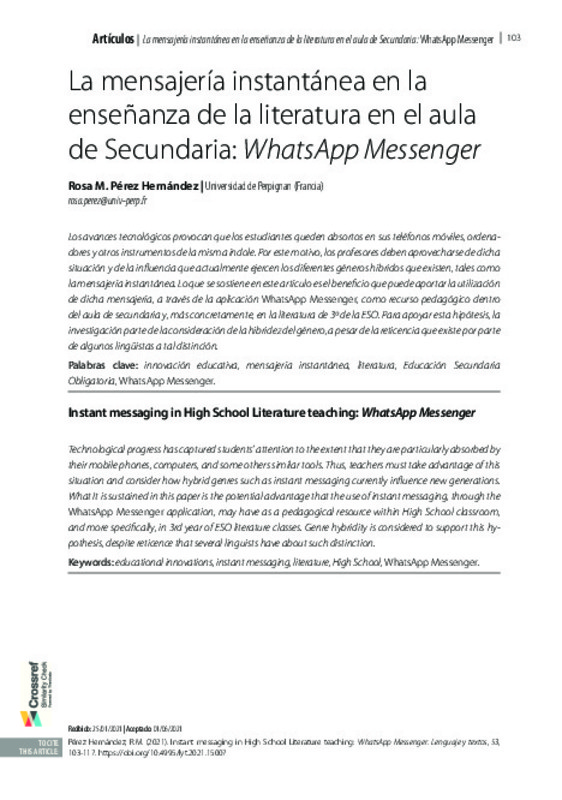JavaScript is disabled for your browser. Some features of this site may not work without it.
Buscar en RiuNet
Listar
Mi cuenta
Estadísticas
Ayuda RiuNet
Admin. UPV
La mensajería instantánea en la enseñanza de la literatura en el aula de Secundaria: WhatsApp Messenger
Mostrar el registro sencillo del ítem
Ficheros en el ítem
| dc.contributor.author | Pérez Hernández, Rosa M.
|
es_ES |
| dc.date.accessioned | 2021-07-08T08:00:13Z | |
| dc.date.available | 2021-07-08T08:00:13Z | |
| dc.date.issued | 2021-06-30 | |
| dc.identifier.issn | 1133-4770 | |
| dc.identifier.uri | http://hdl.handle.net/10251/168971 | |
| dc.description.abstract | [EN] Technological progress has captured students’ attention to the extent that they are particularly absorbed by their mobile phones, computers, and some others similar tools. Thus, teachers must take advantage of this situation and consider how hybrid genres such as instant messaging currently influence new generations. What It is sustained in this paper is the potential advantage that the use of instant messaging, through the WhatsApp Messenger application, may have as a pedagogical resource within High School classroom, and more specifically, in 3rd year of ESO literature classes. Genre hybridity is considered to support this hypothesis, despite reticence that several linguists have about such distinction. | es_ES |
| dc.description.abstract | [ES] Los avances tecnológicos provocan que los estudiantes queden absortos en sus teléfonos móviles, ordenadores y otros instrumentos de la misma índole. Por este motivo, los profesores deben aprovecharse de dicha situación y de la influencia que actualmente ejercen los diferentes géneros híbridos que existen, tales como la mensajería instantánea. Lo que se sostiene en este artículo es el beneficio que puede aportar la utilización de dicha mensajería, a través de la aplicación WhatsApp Messenger, como recurso pedagógico dentro del aula de secundaria y, más concretamente, en la literatura de 3º de la ESO. Para apoyar esta hipótesis, la investigación parte de la consideración de la hibridez del género, a pesar de la reticencia que existe por parte de algunos lingüistas a tal distinción. | es_ES |
| dc.language | Español | es_ES |
| dc.publisher | Universitat Politècnica de València | es_ES |
| dc.relation.ispartof | Lenguaje y Textos | es_ES |
| dc.rights | Reconocimiento - No comercial - Sin obra derivada (by-nc-nd) | es_ES |
| dc.subject | Educational innovations | es_ES |
| dc.subject | Instant messaging | es_ES |
| dc.subject | Literature | es_ES |
| dc.subject | High School | es_ES |
| dc.subject | WhatsApp Messenger | es_ES |
| dc.subject | Innovación educativa | es_ES |
| dc.subject | Mensajería instantánea | es_ES |
| dc.subject | Literatura | es_ES |
| dc.subject | Educación Secundaria Obligatoria | es_ES |
| dc.title | La mensajería instantánea en la enseñanza de la literatura en el aula de Secundaria: WhatsApp Messenger | es_ES |
| dc.title.alternative | Instant messaging in High School Literature teaching: WhatsApp Messenger | es_ES |
| dc.type | Artículo | es_ES |
| dc.identifier.doi | 10.4995/lyt.2021.15007 | |
| dc.rights.accessRights | Abierto | es_ES |
| dc.description.bibliographicCitation | Pérez Hernández, RM. (2021). La mensajería instantánea en la enseñanza de la literatura en el aula de Secundaria: WhatsApp Messenger. Lenguaje y Textos. 0(53):103-117. https://doi.org/10.4995/lyt.2021.15007 | es_ES |
| dc.description.accrualMethod | OJS | es_ES |
| dc.relation.publisherversion | https://doi.org/10.4995/lyt.2021.15007 | es_ES |
| dc.description.upvformatpinicio | 103 | es_ES |
| dc.description.upvformatpfin | 117 | es_ES |
| dc.type.version | info:eu-repo/semantics/publishedVersion | es_ES |
| dc.description.volume | 0 | es_ES |
| dc.description.issue | 53 | es_ES |
| dc.identifier.eissn | 2530-0075 | |
| dc.relation.pasarela | OJS\15007 | es_ES |








